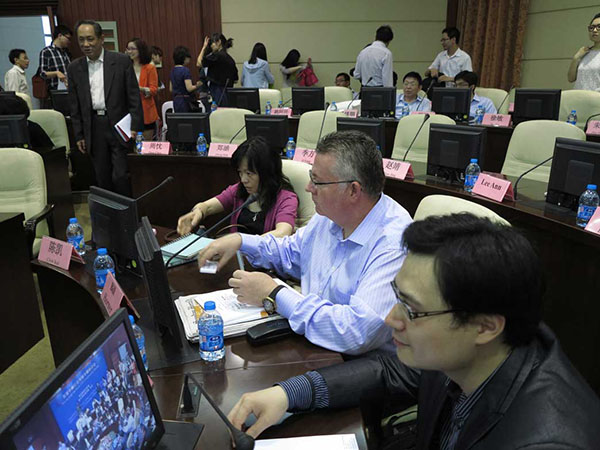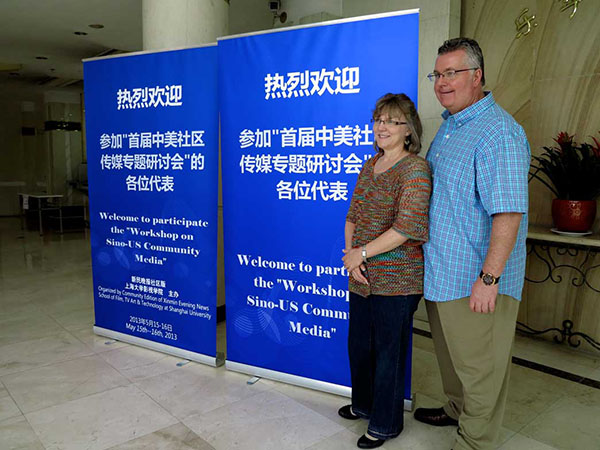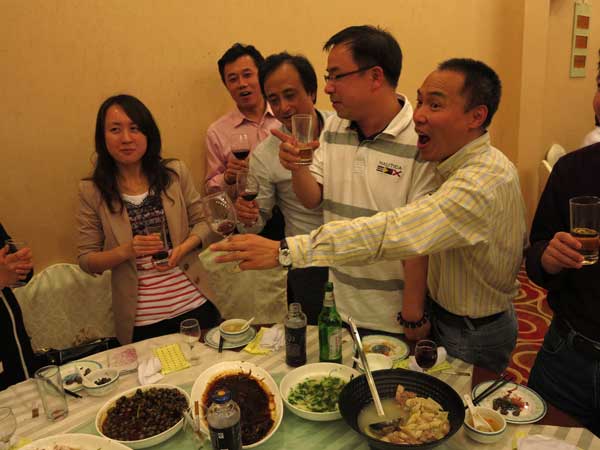Our traveler returns to China this summer for a month of teaching, lecturing and learning at industry and university sites in Shanghai, Nanjing and Chongqing. Last summer, during his Fulbright to Beijing, he was once introduced to a formal conference as “Mr. Joke,” a moniker that has stuck. Following is the record of Mr. Joke’s reprise.

It’s a long way from Sanford to Shanghai. And Sanford Herald Publisher Bill Horner could only dream of ever visiting his grandfather and namesake’s favorite country.
Yet there he was, 9,000 miles from home, strolling with wife Lee Ann along the vividly illuminated waterfront of Shanghai, touring the ancient sites of the Middle Kingdom and rubbing shoulders with newspaper people, like himself, from half a world away.
“A community is all about relationships,” he told a seminal conference on community journalism, held at Shanghai University, May 15-18. Using photographs from the April 2011 tornado as an example of how his newspaper helped his community, Bills said, “We have to be connected together as a people in order to survive events like this tornado.”
Bill’s presentation was yesterday’s keynote address at the “Workshop on Sino-US Community Media: co-sponsored by the Community Edition of the Xinmin Evening News and Shanghai University.

As Bill’s warm-up act, I tried to provide a broad overview on the state of American community journalism. As has been well documented, US community papers have survived the Great Recession in far better shape than their big-city cousins – a fact not lost on the Chinese. That, and the exciting news of Warren Buffet’s putting his money where his faith is – in communities with a strong sense of community.
My colleague, Associate Professor Chen Kai (Karen) of the Communication University of China, served as my translator for yesterday’s event, but she had lost her voice to laryngitis, and was forced to deliver the translations in a hushed whisper. This rendered my message all the more compelling and somehow intimate, as conference-goers leaned forward to catch her words.
.
RE-ENTRY OF THE 600-LB. GORILLA
The issue of press freedom was everywhere in this room, an uninvited guest, the 600-lb. gorilla.
During a Q & A session, a Chinese journalist asked Bill Horner, “Do you have to obey the orders of the regulator?”
I could see Bill taking his time to compose his response. Then he said evenly, “In our country, there is no regulator.”
You could hear the proverbial pin drop.
• Other speakers delivered impassioned addresses, and this one, translated for me, struck a real chord. Prof. Li Liang Rong of Shanghai’s highly –respected J-school, Fudan, U. told the gathering that while the current state of community newspapers in China was in its infancy, the main problem is that many of such newspapers are illegal, according to the Chinese system of newspaper regulation through licensure. (I’m told that the government isn’t issuing any more newspaper licenses, in an attempt to control what’s already out there.)
Rong insisted the way forward should be nurtured by local governments allowing these local papers to grow and flourish. This would mean a fundamental change in existing press law in China.
Currently, if local governments disapprove of the content of the newspaper, that government can fire the reporter, the editor and even shut the paper down.
Knowing this sword of Damocles is hanging over them, Chinese editors and journalists are prone to self-censor.
Thus, he said, the future of community newspapers in China remains tenuous at best. Nevertheless, it is a worthy goal because he believes in the core mission of the community paper to help build community and serve as a “platform for deliberative democracy.”
Then he told a story that illustrates graphically the lack of community in Chinese society.
He told us that he has lived in his apartment for 10 years but doesn’t know his neighbor across the hall.


